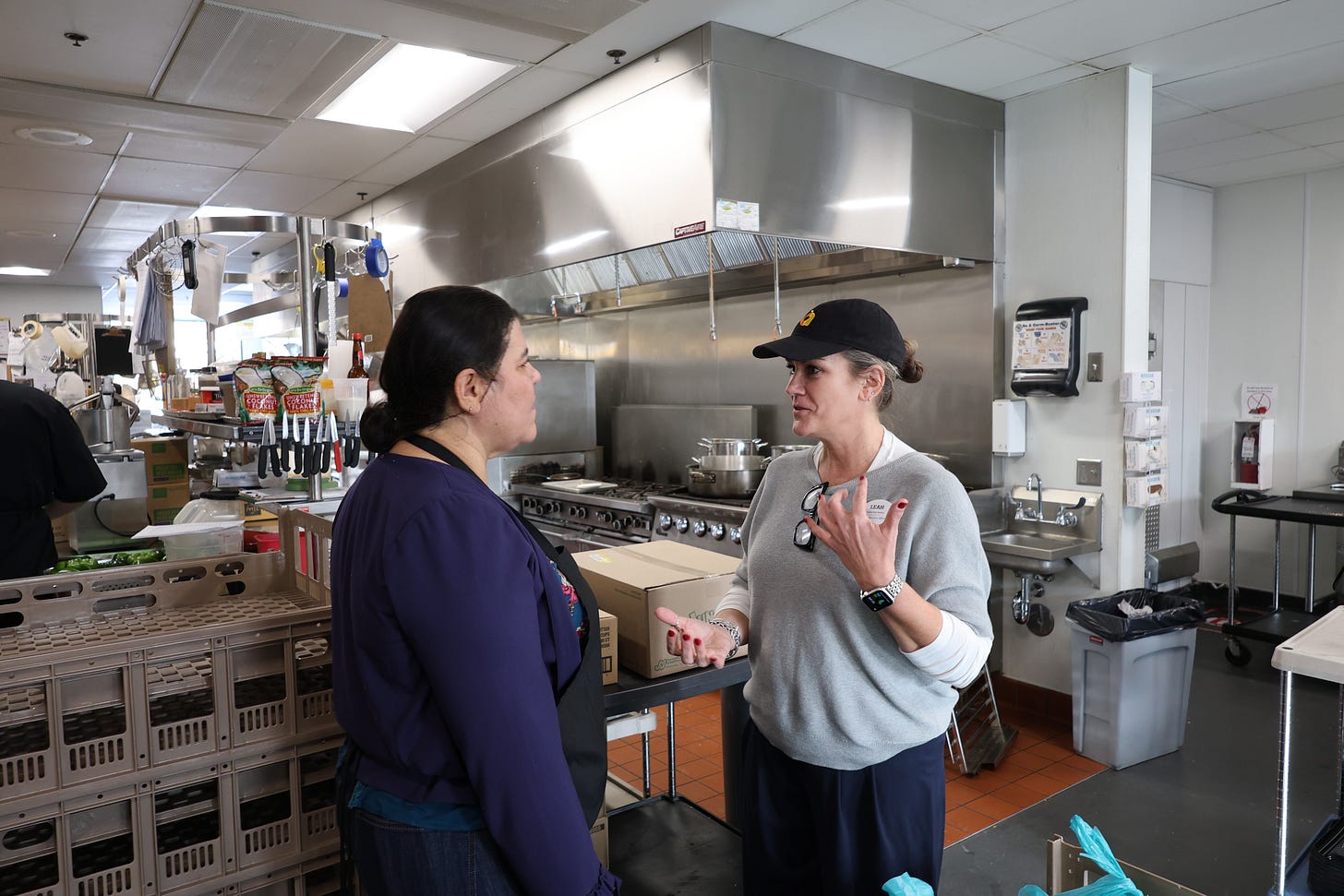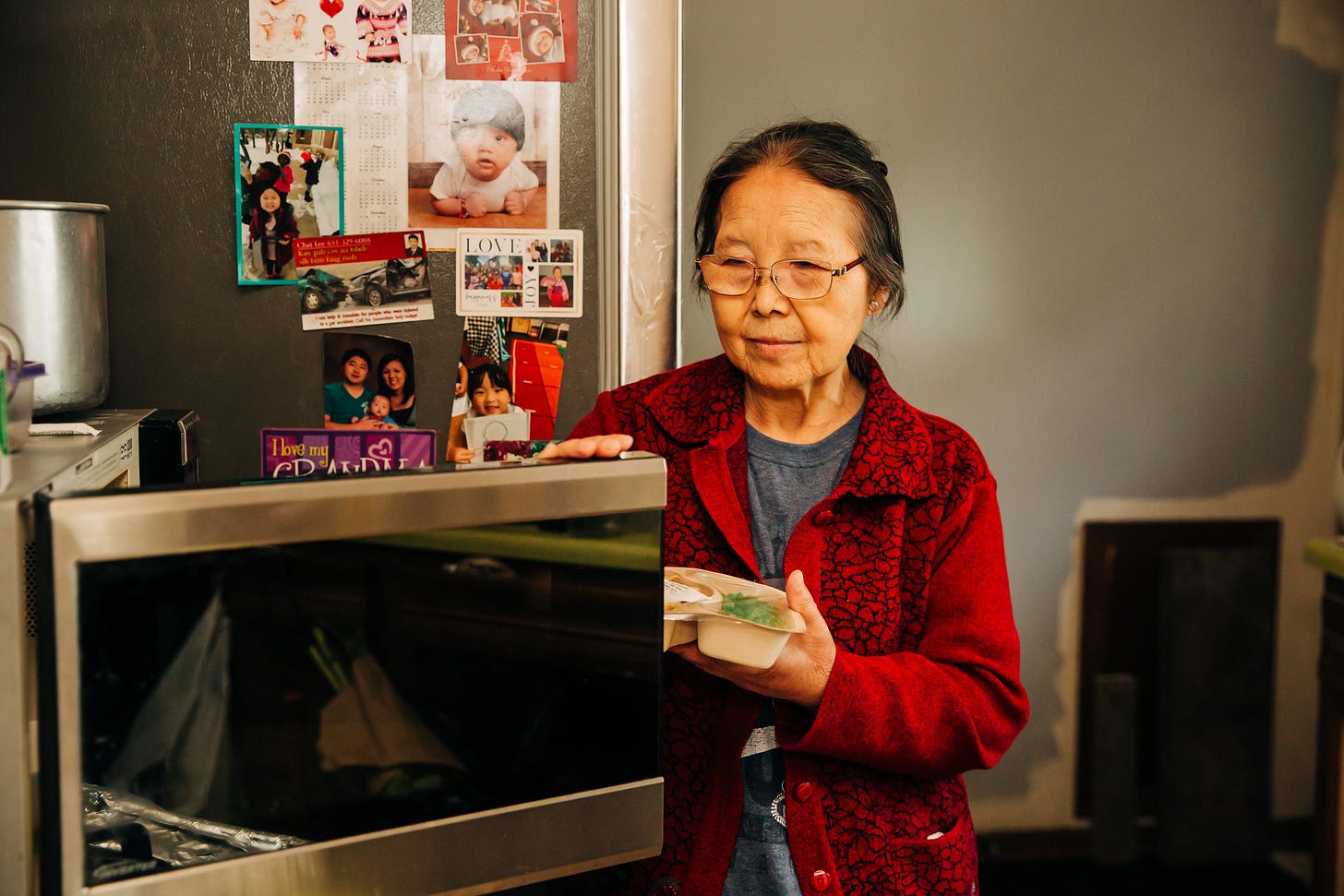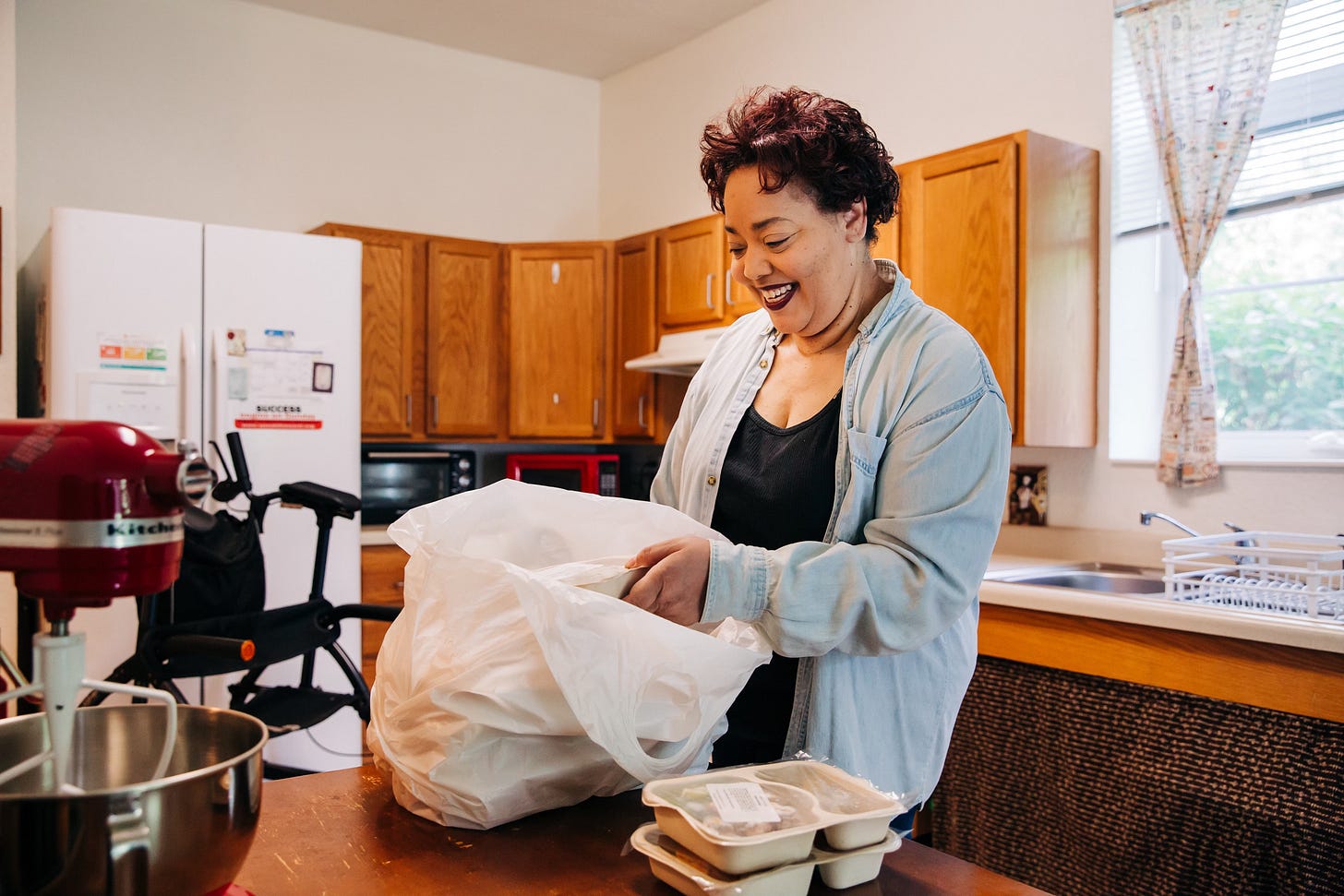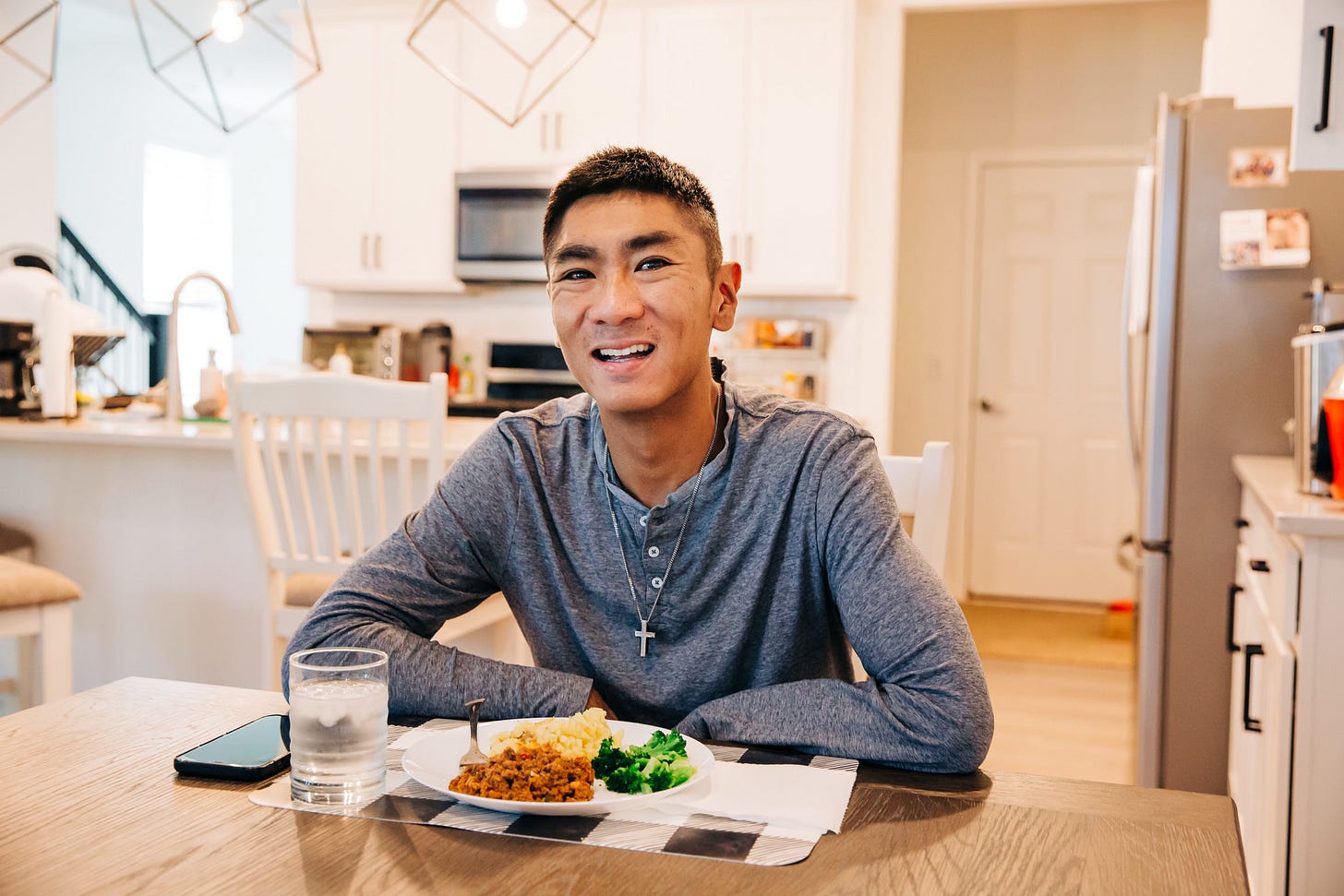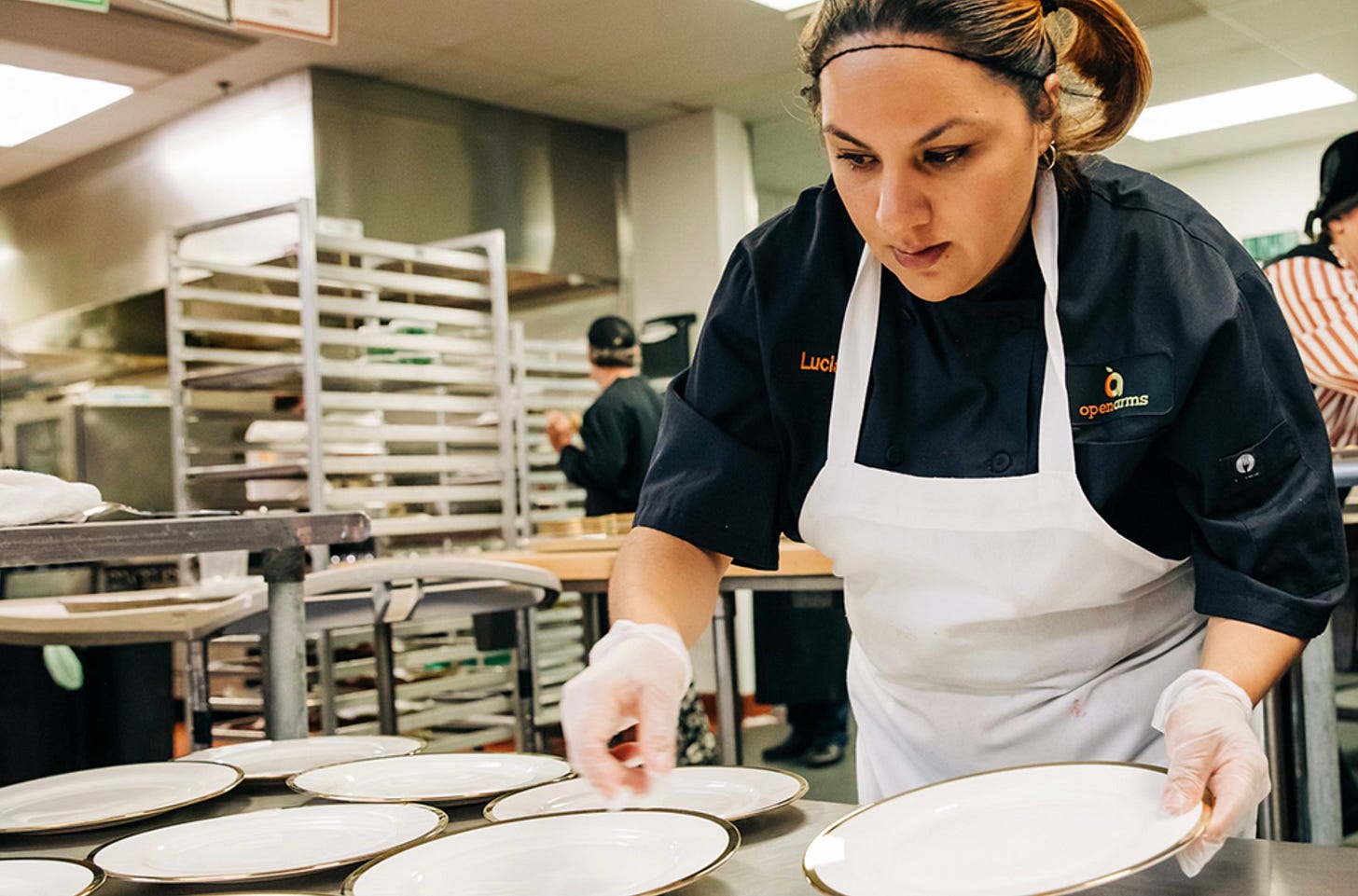Death by a Thousand Cuts: Organization that prepares and delivers medically-tailored meals to critically-ill Minnesotans and their loved ones hit by federal funding cuts
Open Arms of Minnesota pivots to triage mode as cuts to health and healthcare continue | By Kimberly J. Soenen February 14, 2025
(Leah Hébert Welles speaking with Migdalia Loyola Meléndez of Lieutenant Governor Peggy Flanagan's office at the Open Arms Kitchen and Campus in Minneapolis, Minnesota. Photo by Amy Anderson of Amy Anderson Photography.)
Two days ago, I received a text from a source stating that he had been notified that his meal program, called Open Arms—like so many across the United States—was experiencing an abrupt cut in federal funding and his meals would no longer be provided the week after next as select clients were being cut from the program. Clients were notified by phone and updates are being published on the Open Arms website.
Open Arms of Minnesota is a nonprofit organization that prepares and delivers medically-tailored meals at no cost to critically-ill Minnesotans and their loved ones. Registered dietitians and in-house chefs create delicious, medically-tailored menus using fresh and organic ingredients whenever possible. They harvest, cook, and deliver nutritious, made-from-scratch meals directly to clients in need. Their health philosophy is food is medicine.
In 1986, Bill Rowe, the founder, started cooking food in his apartment and delivering it to a handful of neighbors living with AIDS who had become too sick to cook for themselves. Three decades later, the Open Arms operation has grown into an organization with a state-of-the-art facilities in Minneapolis and St. Paul, which has allowed them to prepare and deliver millions of meals to thousands of clients and their loved ones. They also include qualifying illnesses, such as cancer, MS, ALS, ESRD, CHF, COPD, and more.
I contacted Leah Hébert Welles, the Chief Executive Officer of Open Arms to learn more about how these cuts were impacting terminally-ill patients and their families in Minnesota and how the organization plans to survive the cuts.
Hébert Welles has been leading Open Arms since 2013, and has served on numerous boards of directors and community coalitions. She currently sits on the Advisory Board for the Food Is Medicine Coalition (FIMC) as well as the Advisory Board for Second Harvest’s Make Hunger History Campaign.
We spoke at length by phone about the state of the cuts and their impact on patients in need.
(Leah Hébert Welles gives a tour of the Open Arms Kitchen and Campus to St. Paul Mayor Melvin Carter. Photo by Amy Anderson of Amy Anderson Photography.)
Soenen: Over the last month Open Arms was notified about the federal spending cuts and had to make abrupt changes without any warning or time to pivot or plan.
Hébert Welles: We're an organization that is largely funded by a mix of income. About 1/3 is philanthropically supported and 2/3 is a range of contract funding, so those come from the state and the federal government. That allows us to serve our clients free of charge. We never ask our clients to ever pay for meals and that the commitment our organization has made. We remain very committed to never asking people to have to pay because so many of our clients are honestly struggling with food and security or are working really hard to stay insured medically and so we want to make sure that we can be a resource for them.
As a result, we're very dependent on funding. In January, we found out that we've been hit with a big, big cut. That pool of money has been changing and decreasing over the years, so we decided we are going have to cut some staff do some other things because it was $650,000. That's was a big, big hit for us.
Soenen: How are you, your team and your volunteers doing emotionally now?
Hébert Welles: Subsequently, I think we've just started to realize that in the last couple of weeks, the world has kind of turned upside down and especially for nonprofits who depend on federal funding in order to continue to serve people and do their work.
We've all started to realize that the landscape is going to be very different going forward. That caused us to have to really look at everything and make sure that we could be an organization that would survive all of the changes that were coming and have already come for us. That was the beginning of a sort of internal conversation. We have to be here for our clients in two years and four years and six years…so we've got to make some changes now in order to survive this time.
Soenen: Who, specifically, do you serve?
Hébert Welles: The vast majority of our clients are in Minnesota. We do ship meals and have a handful of clients who live in the far eastern part of North Dakota or South Dakota or the far western part of Wisconsin so we can ship meals to the five-state area but primarily the majority of our clients live in Minnesota.
Soenen: Are you part of a larger network?
Hébert Welles: We are part of a national network and several national coalitions. We are part of a Food is Medicine national network and have sister organizations who do what we do. About 12 of them are scattered around the country.
Soenen: Are they all being hurt by these cuts?
Hébert Welles: We all get funding from slightly different places. There are some commonalities. A handful of us have a federal contract, some get Ryan White funding (which helps serve our clients who are HIV Positive), and some get Community Development Block Grant money, which is also been frozen. Some of us have a USDA Grant that comes as another pass through from the state of Minnesota. That's a local Food Purchase Grant which is also frozen right now. So we have a freeze on some of our ability to buy ingredients. We are all being impacted.
(Clients of Open Arms. Photo by Amy Anderson of Amy Anderson Photography.)
Soenen: There's a lot of buzz about “resilience” right now, but if you were already projecting and planning based on your current budget, I assume, like so many leaders, nobody had time to plan for the cuts so everyone's working in triage mode right now. How will this immediately impact your team and clients?
Hébert Welles: The hardest thing about this is how it directly impacts our clients. Sick people. And this is just the beginning for cuts to health programs. We're not taking new clients right now. We're at a pause. Hopefully that will just last a few months, but we had to stop service for hundreds of our clients this week.
Soenen: Out of how many clients was that?
Hébert Welles: 300 were cut of about 1800. It used to be that we would provide food for up to three other people in the house including personal assitants and caregivers. We have cut that down to just one other person in the house.
Our clients are vulnerable and are often food insecure. They are sick with chronic or critical health conditions and are often on Medicaid or Medicare. This is just the beginning of all the cuts and that is what is so devastating. As a leader, it is devastating and and it's devastating as an organization because it so sad and hard to lay staff off.
Absolutely it is even harder to cut clients.
It is really hard to cut expenses. What is really devastating is knowing that the most vulnerable people right now in this country are facing a mountain of losses: The loss of their healthcare, the loss of their SNAP Food Stamp support, the loss of their safety net organizations…It's just the beginning of what will happen to a big group of Americans who are already dismissed, discounted and forgotten.
That's really hard to live with us as a person who cares about people and who has a hopeful vision in this world. I mean, that's what I do. That's what I've been doing for 30 years is trying to make the world a better place for the people who are the most vulnerable. So that's just it. It's devastating. These are sick people.
"These are health conditions that strike at everyone and we have made it our mission to not turn people away. As a society it is vital not to judge the path of somebody else and just trying to help everybody. When we do that, the boat rises. ‘We all do better when we all do better,” is the aphorism coined by our late great beloved Minnesota Senator Paul Wellstone during a 1999 speech to the Sheet Metal Workers Union. I do not know how to tell somebody who doesn't think that we should take care of our neighbors that we should take care of our neighbors. I hope that nothing bad ever happens to that person and they never need any help."
- Leah Hébert Welles
Chief Executive Officer of Open Arms
Soenen: You’ve been at Open Arms for a long time. You know the all of the people all of the clients, all of your staff and volunteers. How are they managing the news?
Hébert Welles: We are working with our clients to try and find other food resources in their community, whether it's a Food Shelf or Meals on Wheels or some of the other resources that are out there. The options often are buying food at a Dollar Store or junk/fast good from the gas station or things like that… I mean, those are real choices for people who have a hard time with mobility or don't have money to afford healthy food every day.
(Clientsof Open Arms. Photo by Amy Anderson of Amy Anderson Photography.)
Soenen: Wide angle on all of this?
Hébert Welles: Closing the doors on these things means ultimately somewhere down the line people will get sicker and unfortunately people will lose their lives because they don't have food. And, they don't have healthcare. I'm really worried about the mosts vulnerable folks in our society.
Soenen: What are the internal conversations taking place now in your Food is Medicine networks and coalitions that support sick people?
Hébert Welles: Open Arms has the ability to lobby as long as it's not a huge chunk of our budget and we're part of many coalitions. We have a national lobbyist and then we have an advocacy program here at the state level. We certainly are advocating all the time…talking to our elected officials and advocating for changes and trying to preserve some funding.
We're lucky we're in a state that does prioritize helping folks and helping the most vulnerable so we are absolutely talking to our local people and trying to make sure that they understand the federal cuts and ust understand how deeply we're going to be affected. We're making lots of phone calls right now and just trying to make sure everybody is aware of what's going on. We're calling our philanthropic partners, too, and our healthcare partners. We want to work together to try and preserve something and try to do as much as we can to sustain Open Arms and the lives of our clients.
This is a moment in time. We have to get past this in time. And we have to be here for our clients.
Soenen: When people say “well, you know, everyone else has to buy their own food. Everyone else has to cook their own food…” Why should taxpayers support programs of this kind? What are the economic, social, cultural, moral and ethical benefits of Open Arms? How has Open Arms leveraged people?
Hébert Welles: That is a big question. You know sometimes I feel overwhelmed by that question because I think, wow, like we're supposed to find common ground right? But how do you find common ground with people who are so far apart on something as basic as takking care of our most vulnerable neighbors? It’s hard for me to get my head and heart around that diconnect.
(Clients of Open Arms. Photo by Amy Anderson of Amy Anderson Photography.)
Soenen: Who received Open Arms meals?
Hébert Welles: Most of our clients actually come from a working-class background. They are people who have jobs, have had jobs, and no longer have the ability to take care of themselves because they are sick. So many people are one paycheck away from losing their healthcare and that's the situation for many of our clients. Get sick, lose healthcare insurance, lose income, lose access. And so…Some people were born with a health condition that they cannot control or they have cancer and we're forced to quit their job. They got diabetes and lost of limb, or they were forced to quit working because they could no longer work while sick.
These scenarios happen to so many people. This loss and need is not limited to a certain group of people who are bad or inherently irresponsible. That’s a fallacy.
Soenen: The “they have been irresponsible” argument or “they deserve healthcare” talking points.
Hébert Welles: Right. Irresponsible. Exactly. These are health conditions that strike at everyone and we have made it our mission to not turn people away. As a society it is vital not to judge the path of somebody else and just trying to help everybody. When we do that, the boat rises.
“We all do better when we all do better,” is the aphorism coined by our late great beloved Minnesota Senator Paul Wellstone during a 1999 speech to the Sheet Metal Workers Union. I do not know how to tell somebody who doesn't think that we should take care of our neighbors that we should take care of our neighbors. I hope that nothing bad ever happens to that person and they never need any help.
(Client of Open Arms. Photo by Amy Anderson of Amy Anderson Photography.)
Soenen: Chance, circumstances and luck impact everybody. Health and Human Services Secretary Robert Kennedy, Jr. recently said in his confirmation hearing that the person who smokes cigarettes all her life is being irresponsible and doesn't deserve healthcare because they're “siphoning” from the system. What is your take on the concept of “deserving” healthcare or having to “qualify” for health insurance?
Hébert Welles: Every single one of us knows somebody who could use Open Arms meals and who needs support at some point in their life whether it's a fleeting point in their life or whether it's at the end of their life. Compassion and empathy should be something that we all work towards and we should want that for our grandparents and our parents and our aunts and uncles and friends…our communities.
Almost everybody has needed help at one point in their life. We're not all born into a Kennedy last name and we don't all have the resources people like that are afforded. What does it say about us as human beings that we're willing to help other people at a low point or through hard part in their life to get to a better point? That's a great thing. That says a lot about us as a society if and when we're willing to do that.
Soenen: Open Arms keeps people out of hospitals by giving them the social structure, warmth and love in their own home, which is more economic and socially smart rather than being in the hospital. So, if people do not support the program on moral and ethical grounds, there is the economic argument to be made for keeping people surrounded by those they love.
Hébert Welles: Yes. So true. I was in a room with the current administration, I would use that argument. There is a lot of data out there on how food is medicine and the ROI on healthy, stable food as medicine. There is an enormous benefit to the society. Our program reduces healthcare costs with nutrition, especially for Medicaid and Medicare. When we provide the right nourishment for somebody who has chronic health conditions, cancer, diabetes, heart disease or is going through end of life, we can keep people out of the hospital and we can get people healthier because food makes a tremendous difference in improving people's health.
(Clients of Open Arms. Photo by Amy Anderson of Amy Anderson Photography.)
Soenen: What gives you hope right now? What keeps you going?
Hébert Welles: The community.
Since we sent out that letter about being cut by the current administration, all of the emails and support we have received from the people who come here every day is inspiring.
We have 7,000 volunteers and when they come into our kitchen, they don't know the people that the meals are going to. They give their time and energy and heart. Those people fuel the organization and that's what fuels my energy right now.
People care about strangers because they know one day it could be them in need.
Soenen: I appreciate the work you do. Thank you, and good luck in keeping it all going.
Hébert Welles: Thank you so much for thinking of us.
COMMUNITY & CONNECTION RESOURCES
A donation to Open Arms directly helps put a delicious, medically-tailored meal on the table for someone in your community living with a life-threatening illness. When you give to Open Arms, you make it possible for our vulnerable neighbors to receive nourishing meals free of charge. All donations are tax deductible. Your support will make an immediate impact on our critically-ill neighbors. Consider a donation here>




